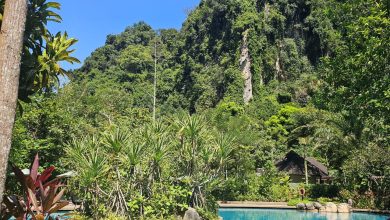Pangkor Island Nature Guide by EcoMy


What comes to mind when the words Pangkor Island appears? Is it the beaches or the seafood? Is Pangkor Island so bereft of attractions that we no longer put it on our holiday bucket list? Or is it because other places such as Langkawi Island, Tioman Island and Redang Island with their attractions that have made Pangkor a dying tourist spot?
A 2D1N visit held from November 26 to 27, organised by Vale Malaysia and EcoMy, has made this scribe re-evaluate my preconceived notions as I explored hidden gems on the Island that was once the home for the Dutch back in the 17th century where they built a fort in the attempt to monopolise the tin industry. The Pangkor Treaty of 1874 was also signed here between the British and the Sultan of Perak at that time, Sultan Abdullah.
As a beach enthusiast myself, I was eager to join the visit by EcoMy, a non governmental organisation founded in January 2015 which focuses on sustaining Eco-tourism as a way to conserve the values and other important elements of natural heritage sites in Malaysia. The purpose behind this visit was to showcase six locals who underwent training with EcoMy to be Pangkor Nature Guides.
A few members of Vale Malaysia joined the trip together with Associate Professor Dr Manohar Mariapan, a venerable academician from the Faculty of Forestry of Universiti Putra Malaysia (UPM). Others included Ted Floyd, the editor of Birding, the flagship publication of the American Birding Associations and representatives from EcoMy, Andrew Sebastian (Co-Founder & CEO) and Dr Evelyn Lim Ai Lin (Honorary Secretary).
Unlike my usual visits to Pangkor, where I usually head to the beach, we were guided by one of the locals, Ismadi Din for a quick trekking session while learning about the trees and plants deep in the Sungai Pinang Reserve Forest. The walk started as soon as we arrived where we were introduced to several unique plants including Pitcher Plants and more. Ismadi also took the initiative to encourage us to protect nature and stop the unnecessary and illegal encroachment as we passed a few spots where trees were chopped down by irresponsible individuals. While taking a short break at the nearby river, we were also introduced to a few different fish found in the river. “Although the public are welcome to visit the area, it is advisable to get a guide like us as you may get lost while roaming around the primary and secondary forests,” said Ismadi.


Our next activities were indeed fun ones where we were assigned to groups to complete some tasks as in a race, including taking photos of Pangkor’s tourist spots. While it may be tiring, this activity is a good example of how you can visit the whole main Island within a few hours.


Later at night, the group was presented with pictures of several species of the majestic Hornbill bird where one of the mentees, Mohammad Pin delivered an interesting speech about his favourite bird.
“Each hornbill has its own uniqueness. For example, every time the Great Pied Hornbill, weighing roughly around 7kg and 120cm long, flies, you can hear a special sound produced by its big wings,” said Mohammad. According to him, in Perak alone, there are up to ten different species of Hornbills and he hopes that something can be done to protect the majestic creature.
The next morning, guided by Ahmad Razi we walked around the beach and learned about the marine life as he related the history of Pangkor and the current sea creatures residing at the beach. We managed to see some sea cucumber, several species of sea snails and a few corals brought by the nearby fishermen.
Pangkor Island currently has the last generation of traditional fishermen residing there, using small boats and equipment to catch fish. While on a good day they get up to 100 small fish, on some days, these hardworking fishermen can only get four to five fish after a long day at sea. Life is hard and it is a dying trade.
The marine walk concluded our quick visit to Pangkor Island. It was amazing to see how much the mentees knew about Pangkor Island and despite their intermediate English, they showed that there are more gems awaiting to be discovered on Pangkor Island. According to Andrew Sebastian, these mentees have really worked hard and have made great strides ever since they started undergoing training six months ago.
Of course there are a few things that still need improvement but I cannot wait for the official launch of the Pangkor Island Nature Guide by EcoMy because I know how great it is going to be. The rest of the mentees: Saiful Joha, Mohd FIrdaus and Suhaimi Abdul are to be commended for their hard work. Congratulations and good luck EcoMy!
Ili Aqilah


